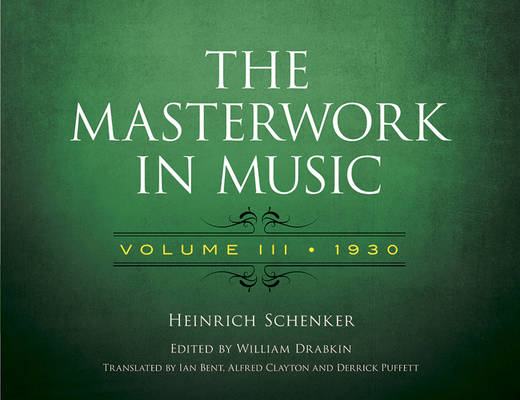
Bedankt voor het vertrouwen het afgelopen jaar! Om jou te bedanken bieden we GRATIS verzending (in België) aan op alles gedurende de hele maand januari.
- Afhalen na 1 uur in een winkel met voorraad
- In januari gratis thuislevering in België
- Ruim aanbod met 7 miljoen producten
Bedankt voor het vertrouwen het afgelopen jaar! Om jou te bedanken bieden we GRATIS verzending (in België) aan op alles gedurende de hele maand januari.
- Afhalen na 1 uur in een winkel met voorraad
- In januari gratis thuislevering in België
- Ruim aanbod met 7 miljoen producten
Zoeken
Omschrijving
The three volumes of The Masterwork in Music present complete English translations of major works by Austrian music theorist Heinrich Schenker, one of the twentieth century's leading figures in the field. First published in German between 1925 and 1930, these essays represent Schenker's greatest writings in analysis prior to the 1935 definitive formulation of his theory of music in Der freie Satz (Free Composition). This new publication of the long-awaited English translation, which first appeared in the distinguished Cambridge University Press edition, provides a valuable resource for scholars. Editorial annotations and elucidations by Dr. William Drabkin and his translators offer additional insights.
This volume comprises the eminent Austrian theorist's main writings from the mid-1920s to 1930. In addition to essays on music theory in cultural context, the book is dominated by one of Schenker's most celebrated studies of a single work: the analysis of Beethoven's "Eroica" Symphony, which discusses all four movements in painstaking detail. Volume One includes analyses of keyboard works by Bach, Scarlatti, Chopin, Beethoven, and Handel and solo violin music by Bach, along with studies of other works. Volume Two contains a major essay on Mozart's Symphony No. 40 in G minor and shorter studies of works by Bach, Haydn, and Reger.
This volume comprises the eminent Austrian theorist's main writings from the mid-1920s to 1930. In addition to essays on music theory in cultural context, the book is dominated by one of Schenker's most celebrated studies of a single work: the analysis of Beethoven's "Eroica" Symphony, which discusses all four movements in painstaking detail. Volume One includes analyses of keyboard works by Bach, Scarlatti, Chopin, Beethoven, and Handel and solo violin music by Bach, along with studies of other works. Volume Two contains a major essay on Mozart's Symphony No. 40 in G minor and shorter studies of works by Bach, Haydn, and Reger.
Specificaties
Betrokkenen
- Auteur(s):
- Vertaler(s):
- Uitgeverij:
Inhoud
- Aantal bladzijden:
- 144
- Taal:
- Engels
- Reeks:
Eigenschappen
- Productcode (EAN):
- 9780486780047
- Verschijningsdatum:
- 19/11/2014
- Uitvoering:
- Paperback
- Formaat:
- Trade paperback (VS)
- Afmetingen:
- 272 mm x 206 mm
- Gewicht:
- 439 g

Alleen bij Standaard Boekhandel
+ 63 punten op je klantenkaart van Standaard Boekhandel
Beoordelingen
We publiceren alleen reviews die voldoen aan de voorwaarden voor reviews. Bekijk onze voorwaarden voor reviews.









